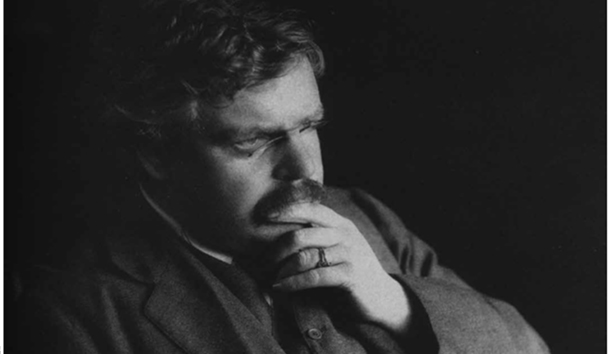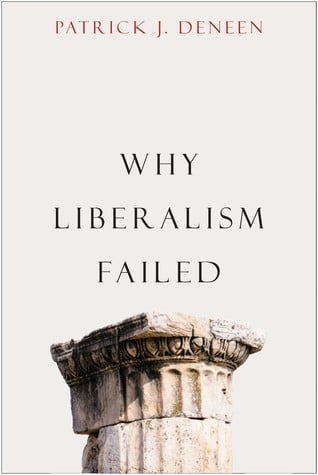“Liberalism has failed,” writes University of Notre Dame political-science professor Patrick Deneen in his new book with a related title. “Nearly every one of the promises . . . made by the architects and creators of liberalism has been shattered,” he adds. Liberalism has “generated pathologies” that have corrupted the nation’s economy and culture and distorted its political order.
Such indictments might lead a potential reader to expect still another screed against ObamaCare, the government regulation of banks, the myth of climate change, and the destruction of our once-great Constitution that pour out of the “conservative” publishing houses. In fact, the targets of Deneen’s withering critique actually include free-market capitalism, a technology that is disrupting both human nature and the natural environment, and the original U.S. Constitution. What’s going on here?
Professor Deneen skewers such sacred cows because they are in practice real expressions of the modern liberal project. He defines liberalism as a regime of “rights-bearing individuals” with “their own versions of the good life,” welcoming technological mastery of nature and free markets, and using government to secure these rights and protect this order. Elsewhere, he describes liberalism as the consequence of a dual revolution: first, the triumph of “anthropological individualism” and a regime of choice over the old order devoted to tradition, place, duties, and kin; and second, a scientific revolution bringing “human separation from and opposition to nature.”
The author denies the common assertion that this liberalism grew naturally out of benign human aspirations and in harmony with human nature. Instead, he insists that it must be seen as an ideology on par with communism and fascism, one seeking “to transform all of human life and the world” in line with its preconceived political plan. While the other two had largely vanished by the end of the 20th century, liberalism has charged ahead, pretending to neutrality while ingratiating itself through “easy liberties, diversions, and attractions of freedom, pleasure, and wealth.”
Now liberalism, too, is breaking down, and for the same reason: It violates human nature. Promising equality, a diversity of cultures, human dignity, and an expansive zone of liberty, it now delivers “titanic inequality,” a stifling cultural “uniformity and homogenization,” “material and spiritual degradation,” and diminishing free- dom. Proclaiming liberty, modern liberals have created massive central governments in Washington, D.C., Brussels, and else- where, with “incomparable arbitrary powers,” particularly over war-making. Also proclaiming freedom of commerce, liberalism has actually spawned what Hilaire Belloc called the Servile State: a relative handful of superrich “winners” ruling over a mass of economic “losers” strangely satisfied by the cheap bric-a-brac of Walmart.
Liberalism enjoyed success by claim- ing “liberty” to be its project, while cleverly upending the meaning of that term. According to the classical and Christian tradition, persons worthy of freedom were those who cultivated the virtues of honor, courage, selflessness, charity, and chastity and learned to practice self-restraint. Indeed, the true “liberal arts” were the academic subjects that shaped persons of virtue and self-discipline. On their better days, our Founders understood this. As a practical example from the early American Republic, Deneen points to the motto found on the seal of The Ohio University (actually, my graduate school, founded in 1804): Religio, Doctrina, Civilitas, prae omnibus Virtus (“Religion, True Learning, Civility, and Virtue above all”). Over time, liberalism successfully recast these qualities as irrational and harmful. The new liberalism meant, in Deneen’s summation, “liberation of the individual from particular places, relationships, memberships, and even identities,” a change consummated over the last half century.
Deneen’s critique of free-market capitalism is particularly strong. He indicts an economic order resting on selfishness and greed. Markets do not magically transform raw human self-interest into wealth for all. They actually corrupt natural human relationships and undermine a true sense of responsibility. His denunciations of economic globalization are frequent and vivid: It is “like a Frankenstein monster” that can no longer be controlled. As he summarizes, “[t]he wages of freedom are bondage to economic inevitability.” The oft-cited conflict between the free market and the central government is a carefully tended myth. The liberal economy actually summons the centralizing state to do its bidding. As economic historian Karl Polanyi once explained, the market economy uses government to destroy local restraints on trade, standardize weights and coinage, enforce contracts, collect debts, and guarantee an open labor contract. On the latter point, Deneen usefully shows how the state-mandated “liberation of women” from their households merely led to their new and more complete bondage within the corporate and state sectors.
Equally disorienting is Deneen’s traditionalist environmentalism. He casts the worship of science as a key aspect of the liberal project, the false promise that human beings could escape the restraints of nature, a dangerous belief “in an expand- ing and potentially limitless human capacity to control circumstances.” He sees human-caused climate change as real: “Our carbon-saturated world is the hangover of a 150-year party.” The “environmental crisis” is the product of human enslavement to “ceaseless appetites.” In this regard, the rapid depletion of material resources runs parallel to a “depletion of moral self-command.”This short-term exploitation of the earth’s bounty cannot last, he insists. Yet its legacy may be horrific. Deneen cites the mounting evidence that even devices like the cellphone and computer are disrupting human brains, “turning us into different [and not better] creatures.”
Most surprising, perhaps, is the author’s discussion of the original Constitution of the United States. The great majority of contemporary American conservatives admire or even worship this document; subsequent troubles are blamed on later innovations like judicial review or the 14th
Amendment. Deneen is a contemporary Antifederalist, on steroids. He describes the Constitution of 1787 as an almost pure expression of liberal ideology, “the embodiment of a set of principles that sought to overturn ancient teachings and shape a distinctly different modern human.” He mobilizes quotations from The Federalist that demonstrate James Madison’s and Alexander Hamilton’s desire for a strong centralized government with “an indefinite power” that would weaken the states and localities, exploit natural resources, and deny democracy in favor of new economic and administrative elites. Particularly disturbing to the standard conservative narrative of our time is Deneen’s near equation of the Founders with the Progressives of the early 20th century:
[T]he Progressives were as much heirs as the Founders to the modern project of seeing politics as the means of mastering nature, expanding national power, and liberating the individual from interpersonal bonds and obligations.
Why Liberalism Fails falters only when Deneen turns to responses, alternatives, or solutions. After his blistering assault on the ideology of liberalism, from its origins to its consummation, he offers a deflating conclusion: “[T]he achievements of liberalism must be acknowledged, and the desire to ‘return’ to a preliberal age must be eschewed.” To this he adds that “we must outgrow the age of ideologies” and settle on “developing practices” in small places “that foster new forms of culture, household economics, and polis life.” He does this in the hope that, out of such experience, “a better theory of politics and society might emerge.” Getting specific, he cites the Old Order Amish, contemporary rural homesteaders, “radical homemakers” of the Shannon Hayes sort, and advocates of the Benedict Option as examples to follow. More specifically, he yearns for the “rituals of family life,” “story and song,” “local markets,” a high degree of family self-sufficiency, and a rebirth of the “arts of association.”
I understand the temptation here. A quarter of a century ago, I wrote a book (From Cottage to Work Station: The Family’s Search for Social Harmony in the Industrial Age, Ignatius Press) that describes how modern family life was being crushed between the two great and secretly allied powers of the globalized economy and the megastate. I concluded, “Failing society- wide renewal, families may, of necessity, fall back on the more modest, but more perilous, strategy of simply protecting their small communities of virtue from extinction.” I continued: “In the footsteps of Benedict of Nursia, they will strive to weather the social and cultural storms gathering in the ‘post family’ era, . . . holding to the promise of salvation.”
I have since grown more aware of the fantasy behind this vision. It assumes that the contemporary liberal regime will allow such communities to go their own way peacefully, and experiment in new forms of Christian (and other) communitarianism. This will not happen. Deneen (like a younger me) underestimates the vicious- ness of the current liberal order. It simply will not permit rivals to emerge, at least not without a (possibly violent) struggle. Deneen does briefly acknowledge this, hop- ing that there is still some openness within the regime, but aware that alternatives will be “permitted to exist so long as they are nonthreatening to the liberal order’s main business.” Then he drops the thought.
One battle will surely be over children. The current liberal order has fully embraced “gender theory,” a logical extension of the liberal idea, including the fundamental human right of every child to find “its” gender identity through proper education and personal experimentation. Any effort to prevent this quest, even by pastors or natural parents, constitutes child abuse, which must be countered. Even the Amish, I predict, will eventually be pushed to submit. And unlike in the age of Benedict, when dissenters could successfully hide in caves and forests, the modern technology that Deneen rightly deplores has made it almost certain that no small group can now hide, anywhere.
There are more promising alternative paths forward, although Deneen’s refusal to look backward would obviate some of them. Aristotle, to choose an obvious example, remains a splendid advocate for humans embedded in and largely defined by their relationships and close communities. The personalism of 20th-century Catholic theory is a solid update. On a broader scale, the neo-Thomism that effervesced in Europe and North America from 1880 to 1960 provides a still grander defense of true communities. On the economic side, the distributism of Belloc and G.K. Chesterton (productive property is so important to human flourishing that everyone should have some) offers a fairly well-thought-out economic alternative, complete with real policy proposals reconciling liberty, equality, democracy, and productivity.
Looking sideways, there are great experiments in postliberal political and economic life occurring right now in real places: in Poland’s Law and Justice Party; in the Hungary of Prime Minister Viktor Orbán; and—yes—in the land of the Great Russians led by Vladimir Putin. After the fall of communism in 1990-91, each of these places tried modern liberalism, only to recoil from its monstrous effects. New political and cultural initiatives are occurring, on national scales, that will produce important lessons for the future—at least among those who can escape the Wall Street Journal’s frenetic denunciations of these regimes.
I commend Patrick Deneen’s Why Liberalism Failed to anyone seeking an honest account of our current political, economic, and cultural predicaments. This book will not confirm the standard conservative narrative of events. However, it will challenge and enlighten any serious reader.

[Why Liberalism Failed, by Patrick J. Deneen (New Haven: Yale University Press) 248 pp., $30.00

Leave a Reply